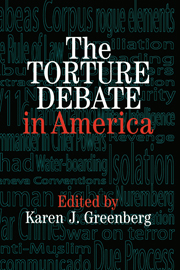Book contents
- Frontmatter
- Contents
- Acknowledgments
- List of Contributors
- Introduction: The Rule of Law Finds Its Golem: Judicial Torture Then and Now
- THE ISSUES
- ESSAYS
- Section One: Democracy, Terror and Torture
- Section Two: On the Matter of Failed States, The Geneva Conventions, and International Law
- 9 Unwise Counsel: The War on Terrorism and the Criminal Mistreatment of Detainees in U.S. Custody
- 10 Rethinking the Geneva Conventions
- 11 If Afghanistan Has Failed, Then Afghanistan Is Dead: “Failed States” and the Inappropriate Substitution of Legal Conclusion for Political Description
- 12 War Not Crime
- Section Three: On Torture
- Section Four: Looking Forward
- RELEVANT DOCUMENTS
- AFTERTHOUGHT
- Index
12 - War Not Crime
Published online by Cambridge University Press: 05 August 2012
- Frontmatter
- Contents
- Acknowledgments
- List of Contributors
- Introduction: The Rule of Law Finds Its Golem: Judicial Torture Then and Now
- THE ISSUES
- ESSAYS
- Section One: Democracy, Terror and Torture
- Section Two: On the Matter of Failed States, The Geneva Conventions, and International Law
- 9 Unwise Counsel: The War on Terrorism and the Criminal Mistreatment of Detainees in U.S. Custody
- 10 Rethinking the Geneva Conventions
- 11 If Afghanistan Has Failed, Then Afghanistan Is Dead: “Failed States” and the Inappropriate Substitution of Legal Conclusion for Political Description
- 12 War Not Crime
- Section Three: On Torture
- Section Four: Looking Forward
- RELEVANT DOCUMENTS
- AFTERTHOUGHT
- Index
Summary
TO BEGIN WITH, I WOULD LIKE TO THANK AMERICAN UNIVERSITY'S WASHINGton College of Law and the International Law Review for putting on this conference. The subject – the Geneva Convention and the Rules of War in the post–9/11 world and in Iraq – could not be more timely and potentially useful. We are at a point now where we have enough experience in the war the terrorists are fighting against us to know how it is being fought by them and needs to be defended against by us. Specifically, we now have a fair idea of how this conflict varies from both traditional wars and normal law enforcement operations – the two familiar structures through which uses of force against civil societies have been customarily dealt with. We need to take the knowledge our experience has given us to establish a new system whose rules are well understood and take account of both the need to protect our citizens and assure that we accurately identify, effectively deter, and appropriately punish those who pose threats to our society or have committed criminal acts.
During the course of the day, I have no doubt the various panels will be exploring the issues implicit in the assignment I have described in detail. In this short keynote address, I will try just to make a few general points that I hope will assist in that work.
- Type
- Chapter
- Information
- The Torture Debate in America , pp. 223 - 228Publisher: Cambridge University PressPrint publication year: 2005
- 1
- Cited by

